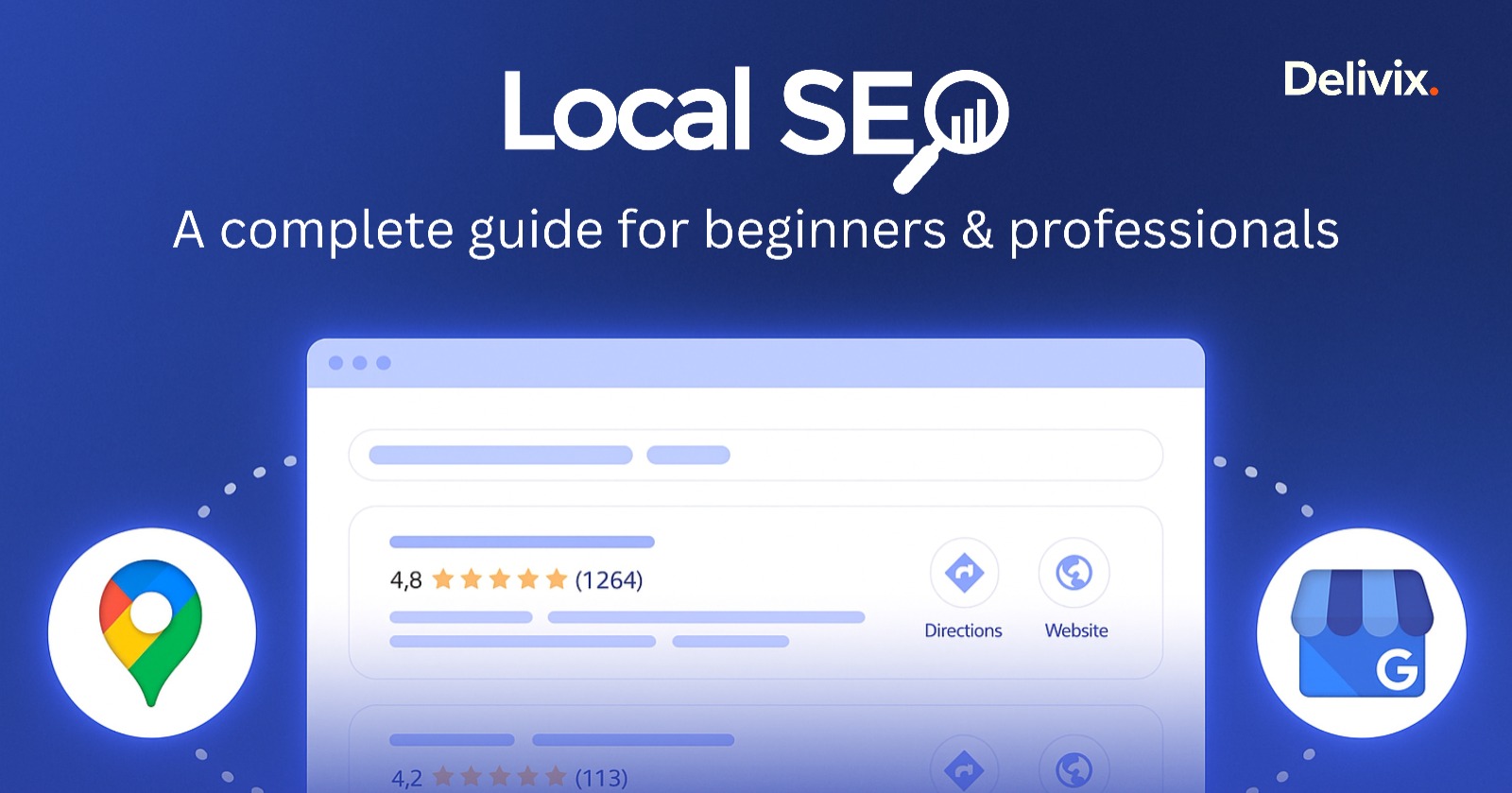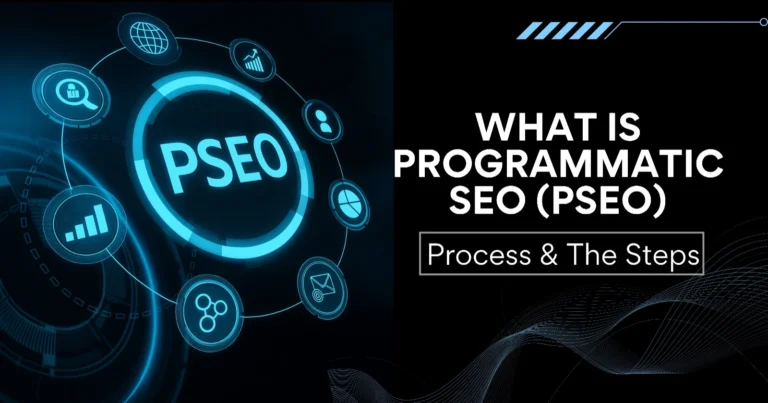It is Friday night, and you are hungry. You pick up your phone and type “pizza near me” into Google, and instantly, a list of pizza shops nearby pops up. You can see their maps, reviews, comments, and phone numbers.
Which will you pick from the list? Most probably the first one.
Now, think that you own a pizza shop. Wouldn’t you want your business to show up on that list, and if lucky, on the first page, and get leads from Google? This is what local SEO does for you.
Local SEO (Search Engine Optimisation) helps businesses show up when people nearby search for their services. Businesses in the local map pack get 126% more traffic and 93% more calls, website clicks, and requests for directions compared to businesses ranked in spots 4-10.
However, 58% of businesses do not optimise for local search, and only 30% have a local SEO plan in place. A major reason is that they are not quite familiar with how to do local SEO.
If you are one such business owner or a marketer looking to understand the difference between being invisible online and being the first choice of customers in your neighbourhood, this ultimate guide is for you.
What is local SEO
You can think of Google like a huge library. When someone searches, Google’s “librarian” quickly pulls out the best and most relevant books (or, in our case, websites).
Local SEO is about convincing Google’s librarian:
“Hey, I’m the best answer for people in this area.”
It is different from traditional SEO, which tries to rank your site everywhere. Local SEO is more location-specific.
For example:
- Traditional SEO might target: “best pizza recipes”
- Local SEO targets: “best pizza in Glasgow”
If you run a local business like a dentist, restaurant, gym, salon, or law firm, local SEO ensures that you are found by the people who can actually walk into your business.
Local SEO vs traditional SEO
| Local SEO | Traditional SEO | |
|---|---|---|
| Focus | Targets customers in a specific location (city, town, neighbourhood) | Targets a global or national audience |
| Keywords | Location-based keywords (e.g., “dentist in Manchester”) | Broad keywords (e.g., “best dentist”) |
| Search Results | Appears in Google Maps & Local Pack (map listings + reviews) | Appears in organic search results (standard blue links) |
| Competition | Competes with nearby businesses | Competes with businesses worldwide |
| Conversions | High-searchers are usually ready to buy locally | Medium-searchers may just be researching |
| Optimisation | Google Business Profile, local citations, reviews, and NAP consistency | On-page SEO, link building, technical SEO, and content optimisation |
| Best For | Brick-and-mortar businesses (restaurants, salons, clinics, shops) | Online businesses, blogs, and e-commerce stores with a wider audience |
Examples of local search queries
These queries usually include a location modifier (like a city name) or terms like “near me” and “open now”, which signal local intent.
- best coffee shop near me
- pizza delivery in Manchester
- car repair shop in Liverpool
- cheap hotels in London
- pet grooming near me
- Web development in Glasgow
Why is local SEO important
Did you know that 94% of high-performing brands have a set local marketing strategy?
The world has gone digital. You have to rank on AI search engines as well. If you are not visible online, you are missing out on customers, as 21% of US consumers search for nearby businesses every day. Here are some reasons why local SEO is a must-have:
1. People Trust Google Maps & Reviews
9 out of 10 consumers use online searches to find a local business (BrightLocal). If you’re not there, your competitors get the business.
2. Mobile Search is Exploding
Over 62% of all Google searches now happen on mobile. Most people searching “near me” are literally around the corner.
3. Local SEO Levels the Playing Field
Even small businesses can compete with big brands locally. This means that you do not need a huge budget, just the right optimisation strategy and techniques.
4. Higher Conversion Rates
Regular website traffic might just be “browsers.” Local searchers are buyers – they need something now.
How local SEO works
We will help break the local SEO process down into simple steps. When someone searches for something, Google looks at three key things, and those three together decide whether you show up in the “Local Pack” (the map listings at the top of search results).
| Relevance | Does your business match what they’re looking for? Example: If they search “Italian restaurant,” but you are a burger joint, you will not show up. |
| Distance | How close is your business to the person searching? Example: If they are in Birmingham, a restaurant in London will not show up. |
| Prominence | How well-known and trusted is your business online? Example: Do you have good reviews? Are you listed in local directories? |
Top local SEO ranking factors
Alright, now we will get into the meat and potatoes of local SEO. The top three factors that influence consumers’ decisions in local search include photos, Google reviews, and a business’s position on the search results page. Here are the building blocks of local SEO:
1. Google Business Profile (GBP)
Businesses with complete GBP listings are 70% more likely to attract visits.
- Formerly called Google My Business (GMB).
- This is your digital shop window on Google Maps and Search.
- It shows your name, address, phone number, hours, reviews, and photos.
2. On-Page SEO for Local Searches
- Use your city/neighbourhood name in titles, headers, and meta descriptions. For example: Instead of “Best Dentist,” use “Best Dentist in Manchester.”
- Create location-specific pages if you serve multiple areas.
3. Local Citations & Directories
- These are mentions of your business on sites like Yelp, Yellow Pages, TripAdvisor, etc.
- Make sure your NAP (Name, Address, Phone) is consistent everywhere.
4. Reviews & Ratings
88% of consumers trust online reviews as much as personal recommendations. You have to encourage happy customers to leave reviews.
5. Local Backlinks
- Backlinks = other websites linking to you.
- For local SEO, try to get links from local blogs, news sites, or community organisations.
6. Mobile & Voice Search Optimisation
- Many local searches happen via voice assistants (Alexa, Siri, Google Assistant).
- Example: “Hey Google, find a coffee shop near me.”
- Optimise for conversational keywords like “where can I get coffee in Bristol?
How to do local SEO
Local SEO might sound technical, but once you learn to do it properly, you understand that it is actually quite simple. Here’s a step-by-step breakdown of how to get started and improve your visibility.
How to Optimise Your Google Business Profile
Your Google Business Profile (GBP) is the foundation of local SEO. It is what shows up on Google Maps and the “local pack” (those top 3 map listings). This is what you should do:
- Make sure your name, address, and phone number (NAP) are 100% accurate.
- Add opening hours, photos of your shop or services, and a short but engaging description.
- Post updates, offers, or events regularly.
- Ask satisfied customers to leave reviews, businesses with lots of positive reviews rank higher.
Local Keyword Research
Local SEO is not about chasing broad keywords like “best gym.” Instead, focus on location-based and long tail keywords that match what people nearby are actually searching for.
Examples:
- “best gym in Leeds”
- “24-hour plumber Birmingham”
- “coffee shop near me”
Tools like Google Keyword Planner, Ahrefs, ChatGPT, or Ubersuggest can help you discover these terms. Even simply typing a phrase into Google and checking autocomplete suggestions works wonders.
On-Page Local SEO Optimisation
Once you know your keywords, it is time to sprinkle them naturally across your website.
- Include city names in your titles, headings, and meta descriptions.
- Add your address and phone number to your website footer.
- Create separate location pages if you serve multiple areas.
- Write blog posts about local events or guides. Google loves hyperlocal content.
Off-Page Local SEO Strategies
Google also checks your presence elsewhere online. That is where off-page SEO comes in.
- Get listed in online directories like Yelp, Yellow Pages, and TripAdvisor.
- Ensure your NAP is consistent across all platforms. Businesses with consistent NAP across directories can see a 23% boost in local search visibility.
- Build local backlinks from news sites, blogs, or community organisations.
- Engage with local social media groups and tag your business location.
Mobile Optimisation & Voice Search
Mostly, people search through mobiles now, and as voice assistants become more popular, people are searching differently, using natural, conversational questions.
30% of all mobile searches are related to location.
In order to stay ahead:
- Make sure your website is mobile-friendly (fast, responsive design).
- Optimise for voice queries like “Where is the nearest Thai restaurant?” instead of short keywords.
- Keep answers on your site concise and clear, so they can be picked up in voice search results.
Reviews & Online Reputation Management
75% of consumers always or regularly read online reviews when researching local businesses. 88% of consumers have avoided a business after seeing negative reviews about it.
Here’s how to manage your reputation:
- Ask every happy customer to leave a review.
- Reply to reviews, thank people for positive ones, and respond calmly to negative ones.
- Showcase reviews on your website and social media.
- Remember: Google takes reviews seriously when deciding rankings.
Advanced Local SEO Strategies
If you have covered the basics and want to go further, here are some pro tips:
- Use schema markup: This helps search engines understand your business better and can display extra info like ratings in search results.
- Track and measure performance: Use Google Analytics and Search Console to see which keywords and pages bring the most local traffic.
- Create localised content: Blogs about neighbourhood news, events, or collaborations with other local businesses can boost relevance.
- Run local PPC ads: Paid ads targeted to specific areas can complement your organic local SEO efforts.
Top tools to help with local SEO
The good news is that you do not have to do everything manually. There are some fantastic tools that make local SEO easier, faster, and more effective. Here are some of the best ones to get started with:
1. SEMrush
SEMrush is an all-in-one SEO tool that helps you with keyword research, competitor analysis, and tracking your local rankings. It also lets you check where your business stands against local competitors and gives tips to improve.
2. Google Business Profiles
Your Google Business Profile is one of the most powerful free tools for local SEO. It helps you manage how your business appears on Google Maps and Search. You can update your info, share posts, and respond to reviews directly from your profile.
3. BrightLocal
BrightLocal is designed specifically for local SEO. It helps you track local rankings, manage citations (directory listings), and monitor reviews across different platforms. It’s especially useful for small businesses that want an easy way to manage everything in one place.
4. Google Analytics
Google Analytics is essential for tracking how visitors find and use your website. You can see which pages people visit most, how much local traffic you’re getting, and whether your SEO efforts are paying off.
5. Moz Local
Moz Local helps you get your business listed consistently across online directories. It automatically pushes your info to multiple sites, saving you time and ensuring your NAP (Name, Address, Phone number) is the same everywhere, which is also a key factor for local SEO success.
How to monitor your local SEO results
Doing local SEO is one thing, but knowing whether it is actually working is just as important. Here is how to monitor your results in simple steps:
1. Track Local Rankings
Use tools like SEMrush, BrightLocal, or Moz Local to check how your business ranks for key local keywords (e.g., “dentist in Manchester”). Keep an eye on both Google Maps and organic search rankings.
2. Monitor Google Business Profile Insights
Your Google Business Profile (GBP) has a built-in analytics section called “Insights.” It shows you:
- How customers found your listing (search vs maps).
- What keywords did they use?
- How many calls, website visits, or direction requests came from your profile?
3. Analyse Website Traffic with Google Analytics
Google Analytics helps you see:
- How much traffic is coming from local searches?
- Which pages (like location pages) are performing best?
- How many visitors are converting (booking, calling, buying)?
4. Track Reviews & Reputation
Reviews affect both rankings and trust. Use tools like BrightLocal or simply monitor your GBP, Yelp, and TripAdvisor regularly. Pay attention not just to the number of reviews but also to overall sentiment.
5. Measure Conversions
Track how many people:
- Call your business.
- Fill out a contact form.
- Visit your store after finding you online.
6. Keep an Eye on Competitors
Check what nearby businesses are doing. Are they getting more reviews, ranking for new keywords, or posting updates more often? Learning from them can give you an edge.
The best local SEO services in the UK
Looking for professional SEO services in the UK, particularly in areas like Glasgow, Birmingham, London, Manchester, or anywhere in the world?
Delivix is the best choice. We have helped hundreds of brands and small business owners improve their visibility online.
So, if you’re looking for a local SEO agency in the UK that really knows how to punch above its weight, Delivix is worth your attention. While many firms promise visibility, Delivix delivers results by combining proven tactics with personalised service.
How much does local SEO cost?
One of the first questions businesses ask is, “How much will local SEO cost me?” The cost depends on your location, competition, industry, and the scope of work needed. But here’s a general breakdown to give you an idea:
| Business Type | Cost Range | What You Get | Best For |
|---|---|---|---|
| Small Businesses & Startups | £200 to £500 per month | Basic optimisation of Google Business Profile, a few local keywords, citations, and some review management | Local shops, cafés, trades people, or small service providers starting out |
| Medium-Sized Businesses | £500 to £1,500 per month | Full local SEO strategy: GBP optimisation, content creation, local link-building, reputation management, monthly reporting | Clinics, law firms, multi-location restaurants, gyms, or e-commerce stores targeting multiple towns |
| Large Businesses & Enterprises | £1,500 to £5,000+ per month | Advanced multi-location SEO, aggressive content and link-building campaigns, ongoing reputation management, competitor tracking | National brands, franchises, or businesses with branches across different cities |
| One-Time Local SEO Setup | £500 to £2,000 (one-off) | Initial optimisations like GBP setup, citations, and website local SEO improvements | Businesses wanting a strong foundation without ongoing monthly costs |
Frequently asked questions
The most common questions we get asked.


